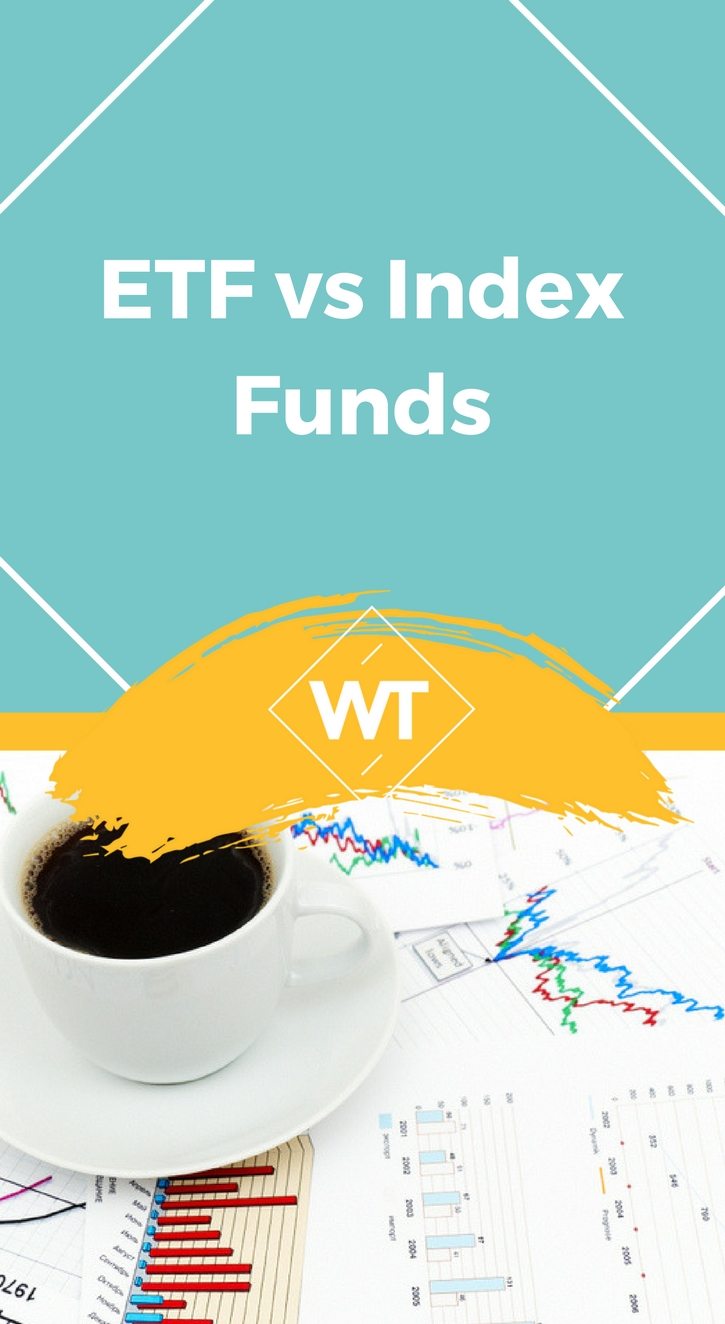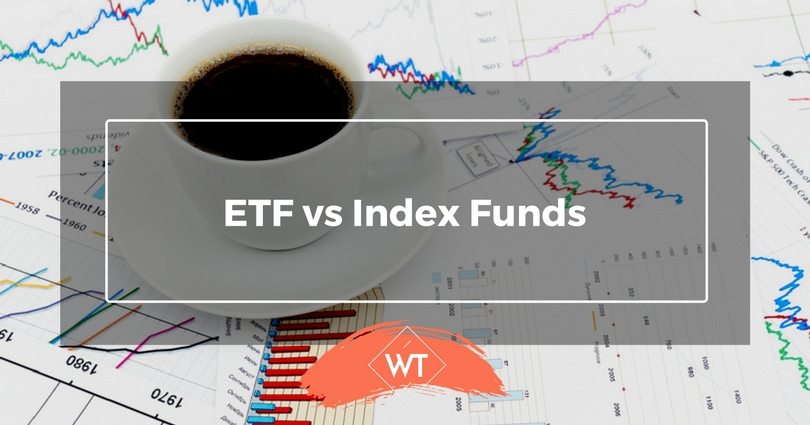ETF vs Index Funds

One of my friends, Mr. Kumar was actually upset spending time picking and investing in stocks. During a casual meeting he asks me “I have lost faith in stock or fund picking nowadays.
I don’t have time or energy for these things anymore”. Kumar had some knowledge about ETFs and index funds, but I started from the basics to make sure he could differentiate ETF vs Index funds. I will discuss some portions of advice given to Mr.Kumar as well as published research and data to back up my assumptions and analysis.
Introduction to index investing
Exchange Traded Funds (ETFs) are hybrid investment vehicles that have the characteristics of both mutual funds and stock combined in to one instrument. If you want to invest in an index, say Nifty, you have two options – one is investing via index ETFs and the other is via index funds (which is well known by many investors).
Index ETFs are the best examples of ETFs that mirror an index and maintain a portfolio which closely tracks the benchmark such as Nifty or the Sensex. On the other hand index funds, which are regular mutual funds also have similar characteristic of closely tracking the index and providing returns proportionate to the benchmark or index returns. Both index ETFs and index funds are good choices for Passive Investors, who are known to be keen on investing in an index portfolio and are happy with index-linked returns.
Example: If you invest in one unit of index ETF when Nifty is at 5200, you may have to shell out Rs.523 assuming Nifty ETF is trading at Rs.523/unit on the stock exchange.
However, if you want to invest in an index fund you need to invest atleast Rs.5,000. Assuming you invest Rs.5,000 and the NAV of ABC Index fund is Rs.100 you will be allotted 50 units of the fund.
However, index funds and index ETFs have a few differences which needs to be examined. For the sake of simplicity let us compare index ETF with index funds, because ETFs in general cover more indices, assets, etc compared to index funds.
ETF vs Index funds
| Features | Index Funds | Index ETFs |
| Minimum Investment | Rs.5000 | This would be low ticket depending on the index. Assuming Nifty is at 5,800, the Nifty ETF would cost Rs.582 roughly |
| NAV | By day end | Real time (intra day) |
| Transaction (Liquidity) | Based on NAV by end of day from the fund | Based on market prices on exchange. So investor can take advantage of intraday price movements |
| Expense Ratio | 1-1.5% | 0.5-1% |
| Transaction Costs | Entry or Exit load where applicable | Brokerage and delivery charges |
| Tracking Error | Due to the cash component that is kept for redemptions this can be higher | Since transaction happen over the exchange there is hardly any requirement of keeping cash for redemptions. So tracking error is lower |
| Investing Mode | By buying units from the fund or through authorized agents | Regular investing is through the market directly (like stocks. However, during the limited initial offer one has the option to buy directly from the fund. |
| Regular Investing | This is possible using the Systematic Investment Plan (SIP) where an auto debit from his/her account is possible | The investor needs to manually invest on regular basis. |
Courtesy: Information partly sourced from Rediff.com/BankBazaar.com
Disclaimer: This is just for knowledge and information purposes. Readers are advised to consult their financial advisor before making investment decisions. Also individual product features can vary from the category (index fund/ETF) as a whole.
Why ETFs score over index funds?
ETF vs Index funds – which is a better passive investment? Index funds are good passive investment vehicles but index ETFs are even better than index funds as evident from the points above. Some of the key advantages as evident from the table above are:
- Price transparency due to daily trading
- Low transaction costs
- Low recurring costs (expense ratio)
- Minimal (Lowest) tracking error
In terms of cost and efficiency ETFs are better than index funds, however, index funds are still far better than other mutual funds (diversified funds, sector funds, etc.). One area where index funds score over ETFs is the option to invest through SIPs. However, in recent times some ETFs have also started providing this facility.
ETFs are known for their flexibility, because you can buy one unit of Nifty Bees (Nifty ETF) for Rs. 575 (assuming Nifty is around 5730), and you can accumulate more if the market falls to 5550.
This way your overall long term holding cost reduces over time, provided you have a long term view of the market. When the market goes up significantly (say 15-20% upside) you can sell your holdings partly and invest in other asset classes such as gold, fixed deposits, etc or use the funds for other life goals or needs.
Although we have compared index ETF with index funds, (ETF vs Index funds) – the ETF category as a whole is much larger and can provide investors the option to diversify across asset classes such as Gold, international equity, etc.
Active vs. Passive Investment Debate
Time and again there has been a debate about active style of investing vs. passive style of investing. Believers in active style have faith that their stock picks or funds would outperform the index due to superior stock selection, investing process and methodology.
The passive style group on the other hand has a strong belief in simply matching index performance, which according to them is good enough.
The passive investors group believes in efficient market hypothesis (which says that all news and information is prices in stock prices). The passive camp is not bothered about out performance and would rather be happy with returns equivalent to the benchmark returns.
For small investors active funds (mutual funds) has been the best route to invest in equity, but today investors have index funds and a basket of ETFs to choose from.
Research and past data comparing some of the best mutual funds with their benchmarks show that in most cases very few funds managed to surpass index (benchmark) returns. So why not invest in the index directly?
Conclusion
Whether you are a large investor or small, its very important to be in tune with the changing times. Today diversification by spreading across many stocks has lost its value.
Finance graduates who learn about systematic and unsystematic risk know that unsystematic risk (which is company or industry specific) can be reduced by diversification. Today, financial advisors as well as investors are keen on diversifying across asset classes rather than trying to pick more stocks and funds.
Increasing the number of stocks or funds in your portfolio to diversify is just becoming as old fashioned as putting cash under the carpet or pillow.
Today, diversifying across asset classes known as Asset Allocation is the key to long-term investing because each asset class be it debt, equity, real estate, gold, etc have their own cycles and patterns and are not directly co-related. So if you have 3 or more asset classes in your portfolio you will be better off than having just 20 stocks and assuming that you are diversified.
Asset allocation helps you to spread across two or more markets thereby diversifying across assets as well as markets, which will provide more stability to your portfolio.
So once you have invested in index ETFs your equity allocation is more or less complete. You may increase or decrease this amount depending on prevailing market conditions. Any surplus can be invested in other asset classes such as Gold, fixed deposits, etc so that you are not at the mercy of equity markets like Mr.Kumar. Hope there is better clarity on ETF vs Index funds now.
Read more at – Index ETFs in India









Leave a Reply